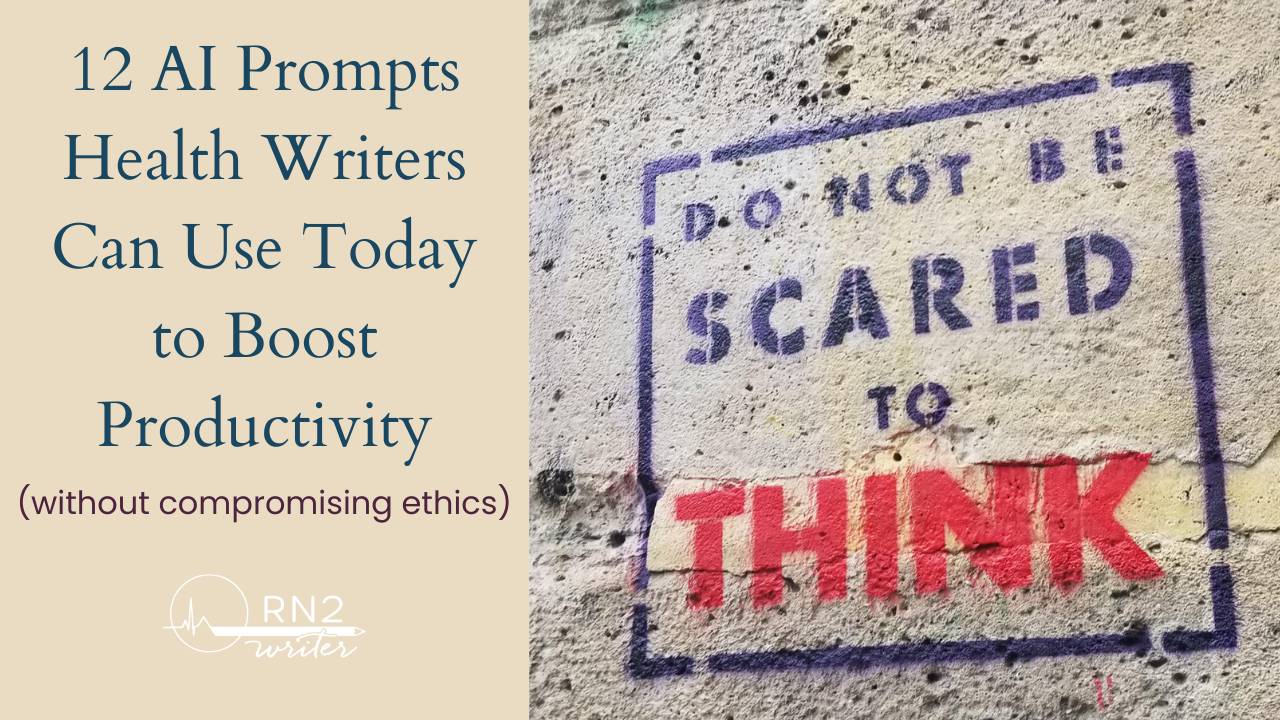Will AI Replace Health Writers? Here’s the Honest Truth

By Elizabeth Hanes BSN RN
Freelance health journalist and founder of RN2writer
Elizabeth is a nurse turned six-figure freelance writer. Her work has appeared in WebMD, Verywell Health, Cardinal Health, and many other major healthcare brands and publications. She now helps nurses transition to freelance writing through RN2writer - an accredited provider of Continuing Nursing Education.
Every time a new technology explodes into the mainstream, freelance writers start to sweat. And right now, nothing is causing more hand-wringing than generative AI.
With tools like ChatGPT and Google Gemini cranking out articles in seconds, many health writers—especially those coming from nursing backgrounds—are wondering:
Am I about to be replaced?
Let’s talk about that. Because the truth is more nuanced than the headlines (and Twitter panic) would have you believe.
Yes, AI Can “Write.” But That Doesn’t Mean It Can Do Your Job
There’s no denying that AI tools are getting better. They can:
-
Draft blog posts based on prompts
-
Summarize long documents
-
Suggest headlines and outlines
-
Rewrite content for different audiences
-
Generate catchy LinkedIn posts or newsletter blurbs
For clients focused purely on speed and cost, AI is incredibly attractive.
But here’s the thing: clients who only want fast and cheap were never your ideal clients anyway.
The organizations worth working with—those in health tech, hospitals, or medical communications—care deeply about accuracy, ethics, and credibility. That’s where AI fails, and where you shine.
What AI Still Can’t Do (and May Never)
Let’s get specific. Here’s where generative AI falls short—and where your nurse-writer skills create major value:
🔸 Clinical Nuance
AI struggles to understand the difference between “hypertension” and “elevated blood pressure,” or when it's appropriate to recommend one treatment over another. You don’t.
🔸 Real-World Context
No algorithm can replace the perspective of someone who’s actually provided patient care, charted in an EHR, or navigated the complexities of hospital systems.
🔸 Interviewing Humans
AI can’t conduct interviews with clinicians or patients, build rapport, or ask insightful follow-up questions. You can—and that skill is golden.
🔸 Storytelling
Machines spit out sentences. Writers craft stories. That human connection is what engages readers and builds trust.
🔸 Ethical Oversight
As a health writer with a clinical background, you understand HIPAA, FDA regulations, and ethical boundaries. AI doesn’t. (And clients know that.)
The Smart Clients Are Not Replacing You—They’re Hiring You to Work With AI
Believe it or not, many clients are not looking to eliminate freelance writers. They’re looking to work differently.
Here’s what that looks like in the real world:
-
AI-first drafts + human editing: Clients generate a rough post in ChatGPT and hire you to fact-check, add clinical accuracy, and improve flow.
-
Human-led content strategy: AI can’t help them choose the right message for the right audience—but you can.
-
Ghostwriting: AI can’t capture the voice of a CMO or doctor. You can.
-
Interview-based content: Blogs and articles based on original interviews are more important than ever.
In other words: you’re not being replaced. You’re being repositioned—as a strategist, an editor, a credibility-checker, and a storyteller.
What Might Be Replaced?
Let’s be real: some types of writing will become harder to sell. These include:
-
Basic SEO blogs on common health topics
-
“Listicle” content like “5 Benefits of Vitamin D”
-
General health tips that don’t require credentials
If your entire business is built on writing $75 blog posts about sleep hygiene, it’s time to evolve.
But if you’re offering expertise-driven content, you're in a strong position.
The Real Threat? Waiting Too Long to Adapt
Here’s the hard truth: AI is changing the game. But that doesn’t mean you’re doomed—it means you have to adjust your strategy.
Nurse-writers who embrace this shift will thrive. Those who ignore it…not so much.
This moment is less about replacement and more about reinvention.
Ask yourself:
-
Could I offer content audits for AI-generated drafts?
-
Can I highlight my clinical judgment more clearly in my pitch emails?
-
Should I specialize in something AI can’t touch—like regulatory writing or patient interviews?
You don’t have to learn to code or become a prompt engineer. You just need to lean harder into what makes you uniquely valuable.
Let’s Future-Proof Your Freelance Business—Together
We created a special video training for health writers just like you, called AI-Proofing Your Writing Business.
In it, we break down:
-
What AI can and can’t do
-
What types of writing are most at risk
-
How to shift your positioning so clients see your value
-
How to work with AI without losing your voice or integrity
AI isn’t the end of freelance writing—it’s a new chapter. Let’s make sure you’re writing it on your own terms.
👉 [Watch AI-Proofing Your Writing Business today and get ahead of the curve.]
By the way...this training awards 1.0 contact hour of continuing nursing education!
This post was produced with an assist from ChatGPT.









